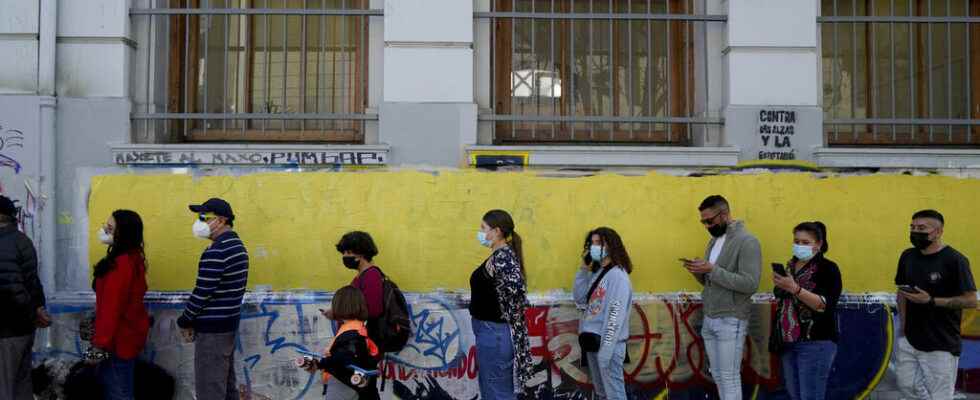The Chileans were called to the polls, this Sunday, September 4, to approve or reject the proposal for a new Constitution. The latter includes in particular the guarantee by the State of access to the right to education, public health, retirement and decent housing. But today, Chilean society is very divided and polls show that the ” rechazo », the rejection of this text, could prevail.
While midday turnout figures are not yet known in Chile, long queues stretch outside many polling stations, especially in major cities like Santiago or Valparaiso.
The referendum for the adoption or rejection of the new Constitution is indeed mandatory, reminds our correspondent in Chile, Naila Derroisne. A novelty, because since 2012, voting is voluntary in Chile. But this Sunday, September 4, Chileans who do not vote risk a fine which can amount to 190 euros.
The very date of the referendum, September 4, is heavy with symbols. It refers to the election of socialist Salvador Allende on September 4, 1970. Three years later, his government was overthrown by Augusto Pinochet’s coup. It was under his dictatorship that the current Constitution was put in place, in 1980. The neoliberal basis of a model that allowed decades of stability and economic growth, it also generated a profoundly unequal society.
Several Chileans consider that the vote of the day is the most important of the last thirty years, since the return of democracy. They have, they say, the possibility of democratically choosing what will be the future of their country. A young student thus confided to feeling relieved to have voted, after having spent a sleepless night. He is looking forward to tonight’s results.
►To listen: Constitutional referendum in Chile: “This Constitution would be a real revolution in Latin America”
Despite the show of force of the “yes” supporters, who gathered more than 250,000 people Thursday, September 2 in Santiago at the end of the official campaign – against barely 400 for supporters of the “no” – the polls predict, without exception, the victory of the “I reject” the proposal for a new Constitution.
Very polarized Chileans
Chilean society is extremely divided On the question. Claudio, a 50-year-old driver, for example, is completely opposed to the text. This is what he explains at the microphone of Melissa Barraspecial correspondent for the Spanish-speaking editorial staff of RFI.
The people who vote for this project for a new Constitution, which is a disaster, have got used to working as little as possible, to being assisted by the State for the rest. What concerns me is to know in which city and in which country my children and my grandchildren will live. I want them to be able to move around this city peacefully, without fear of being mugged or having their car stolen around the corner or at a red light.
Opposed to the new Constitution, Claudio fears above all insecurity
Felipe, he chose to approve the text. This 27-year-old actor believes that, despite its flaws, the draft Constitution contains significant social and environmental advances. The text proposes in particular that the State can guarantee Chilean citizens the right to education, public health, retirement as well as decent housing, environmental rights or even the recognition of indigenous peoples.
I am for text approval. Not everything that is offered has to be absolutely perfect. There may be flaws. I come from the north of Chile, from Nogales, an area that has been affected by mining. I believe that in this new Constitution, more attention will be paid to the environment, to taking care of water, that it is no longer privatized, but that it is a right for everyone. So I believe this change will be beneficial.
This Sunday, Felipe votes in favor of a new Constitution for Chile
Towards a new beginning?
A rejection of this proposed Constitution, drawn up for a year by a Constituent Assembly elected in May 2021 and composed of 154 members, would not mean the freezing of all reforms.
” There is a consensus that the 1980 Constitution is no longer valid and that we should move on to another », establishing « new social, political and economic rights “, explains to Agence France-Presse Cecilia Osorio, of the University of Chile.
If the rejection wins, President Gabriel Boric announced that he would ask the Parliament to launch a new constitutional process starting from zero », with the election of a new Constituent Assembly to draft a new text.
But if the yes wins, Chile’s new Basic Law will come into effect in ten days.
